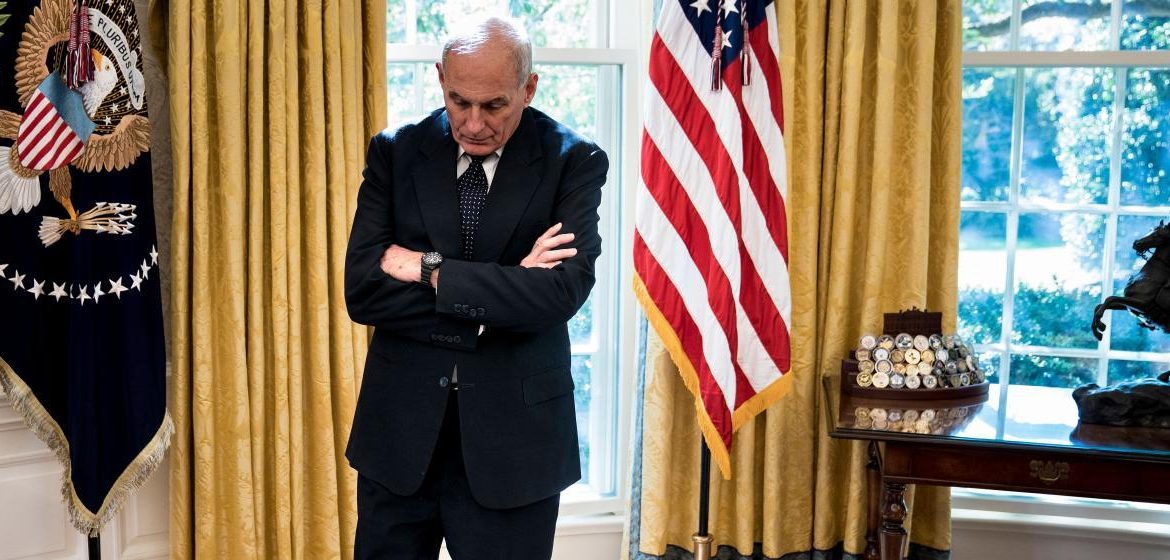This material belongs to: The Week.
What happened to John Kelly?
Consider last week’s extraordinary remarks by the decorated Marine general officer turned White House chief of staff. Kelly was dispatched to quell a simmering controversy about the empathy-challenged President Trump‘s call to the widow of one of the U.S. troops killed recently in Niger.
Many conservative pundits, desperate to find anything nice to say about the Trump administration, nearly tripped over themselves to praise Kelly.National Review‘s Rich Lowry hadn’t been so spellbound since Sarah Palin “sent little starbursts” through his television screen. Calling Kelly “the adult in the room,” Lowry said the “moving, impressive, highly informative statement” should put “an end to this whole thing.” It didn’t; quite the opposite, in fact. Yet two days later, Lowry was still gushing. “I think it should be studied in rhetoric classes,” he wrote. Except for, er, one little “flaw”: It turns out Kelly gratuitously smeared Rep. Frederica Wilson (D-Fla.), claiming she had taken credit for securing federal funding for an FBI building. (She made no such claim.) Future professors of rhetoric will have to excise that part of the speech from their textbooks!
It’s true that, when wrenched from its explicitly political context (he was there to perform damage control), Kelly’s speech was emotionally affecting, evoking as it did the memory of his own son and other fallen Americans now buried at Arlington National Cemetery. But without appearing insensitive to Kelly’s loss, it must be asked how, precisely, it mitigated Trump’s apparent tone-deafness toward a widow who subsequently revealed the conversation left her in bitter tears.
Like many men of his age and background, John Kelly thinks the world is going to hell in a handbasket. Nothing is sacred anymore. Not women. Not religion. Not official phone calls answered in automobile. Fine. Lord know he’s earned the right to express his opinion. But the sum total of Kelly’s rhetoric amounts to a rhetoric-class grade of F for “Inapposite Handwaving.”
And lest we forget, Kelly’s emotionally charged, factually challenged speech was in essence a coverup of yet another Trump lie. The president had denied the underlying facts of Rep. Wilson’s story (“I didn’t say what the congresswoman said; I didn’t say it at all“). In relating how and why he coached Trump in what to say, Kelly tacitly confirmed them.
All of this should be clear to any dispassionate observer of this unfortunate episode of our national Trumpian psychodrama. Why does Kelly’s behavior — I reluctantly call it dishonorable, given the depraved nature of the man whose reputation it was designed to protect — get a pass from the right? Some of it surely has to do with the place that general officers occupy in our popular imagination. From the founding era through the Eisenhower administration, we’ve had our share of generals-turned-president. That makes sense: In addition to strategic intelligence and physical valor, rising to the rank of general requires no mean ability to navigate bureaucratic channels. It’s a mark of political skill, in other words.
The right-wing fascination with generals has become especially pronounced in recent years. Indeed, it has become something of a fetish — not least for the president himself. Trump seems to relish the “from-central-casting” look of the former generals on his staff, quite apart from their impressive resumes. But the fetish predates Trump. National Review‘s Victor Davis Hanson published a book in 2014 likening certain generals to “saviors.” William Kristol and a group of rich donors talked of “conscripting” James Mattis into the presidential race as a last-ditch attempt to thwart Trump. Mattis, of course, became Trump’s defense secretary. And the likes of Hanson have taken Trump’s penchant with hiring generals as proof that he “values merit over politics.” (This is a particularly rich characterization of a man who brought Omarosa Manigault and Anthony Scaramucci into the White House.)


